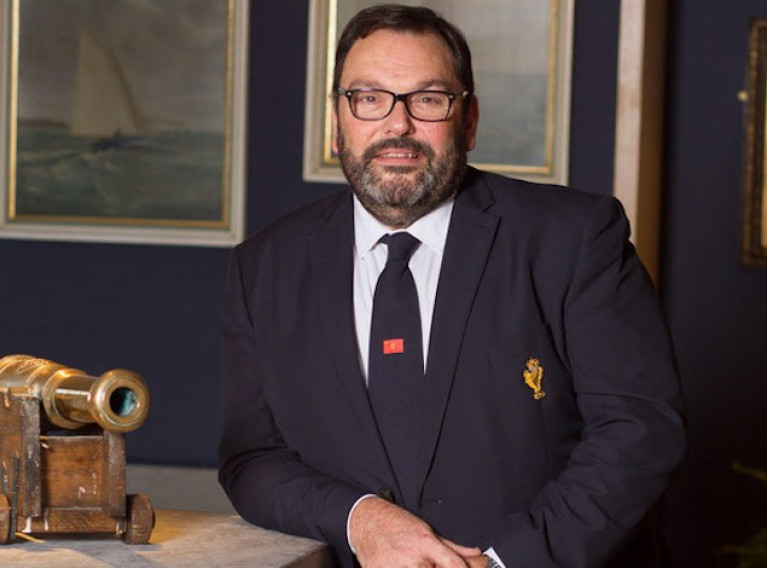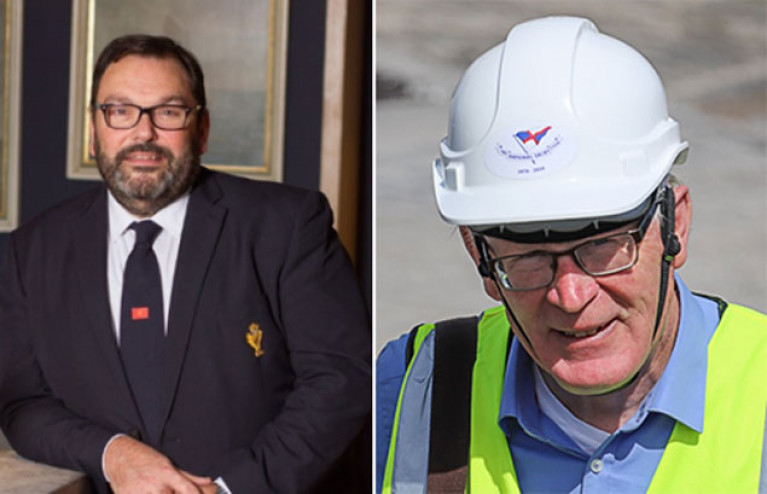Displaying items by tag: Colin Morehead
Colin Morehead, Admiral of the Royal Cork Yacht Club, which celebrated its 300th birthday last year, has been named as Cork Person of the Month for January 2021.
At the Cork Harbour club's 300th AGM, Colin Morehead was elected the 42nd Admiral of the Royal Cork Yacht Club. Unfortunately, due to COVID-19, many of the Club’s planned 300 birthday celebrations had to be cancelled last year. Morehead has been part of the Royal Cork all of his life, following in the footsteps of generations of his family before him. Upon receiving the title of Admiral, Colin outlined his wish to develop a five-year plan for the club, along with the development of a new sustainability plan for the club which underpins all of the club’s activities. As Admiral, Colin’s passion and dedication to the club has become ever more prominent, as he has worked to successfully maintain and grow the institution that is the Royal Cork Yacht Club.
Additionally, Morehead has ambitions to secure an additional European or World Championship event to be run at the club by 2023.
The Royal Cork Yacht Club (RCYC) is based in Crosshaven, Cork, and is the world's oldest yacht club, founded in 1720. The Royal Cork Yacht Club is one of the World’s leading Yacht Clubs and is in the forefront of all branches of sailing activity. The members of the RCYC are the organisers of the biennial Cork Week, widely regarded as Europe’s premier sailing event. The club has hosted many National, European & World Championships, putting Cork on the map for its sailing prowess. Its members compete at the highest level in all branches of sailing, and the club has a number of World, Olympic, Continental and national sailors among its membership.
Speaking on his success Admiral Colin Morehead said, “To be named as Cork Person of the Month is an honour. Having been involved with the Royal Cork Yacht Club all my life it is truly rewarding to receive this accolade. But nothing that I have done at the club could have been achieved without the support and dedication of the staff and the club's incredible committee’s and volunteers. Volunteers give of their time and services freely and they are held with the utmost regard at all times by all club members.”
Awards organiser Manus O’Callaghan said, “The Royal Cork Yacht Club has always been a place of enormous importance for Cork sailing enthusiasts. With the committed and passionate Colin Morehead as Admiral, the club will no doubt go from strength to strength, over the next 300 years. RCYC, as the oldest yacht club in the world in one of the great harbours of the world, is something all Cork can be proud of. "
Colin Morehead, who was nominated for this award by Barry and Carmel Woods and others, name will now go forward for possible selection as Cork Person of the Year, with the other Persons of the Month chosen in 2021.
Colin Morehead & Martin McCarthy are "Sailors of the Month (Services to Sailing)" for August
It is unusual to have two leading figures sharing the "Sailor of the Month (Services to Sailing)" award. And it surely unique when one is Admiral of the world's oldest yacht club, the Royal Cork at Crosshaven, in its Tricentenary Year, while the other is Commodore of the National YC in Dun Laoghaire as it marks its 150th Anniversary.
Yet both have shared an indomitable spirit in encouraging and leading their members in whatever sailing and club activity is possible through the COVID-19 crisis, and both, in turn, have seen their members support with a sense of responsible community which is a credit to both clubs, and to Irish sailing generally.
This was celebrated by a very special occasion on the morning of Saturday, August 22nd, when a small but select and carefully-choreographed gathering, hosted by Commodore Martin McCarthy at the National YC, marked the imminent start of the Fastnet 450 Race to the Fastnet Rock and Crosshaven. Afloat and ashore, it was to be a very special event which cemented the links between the clubs and their senior flag officers, and provided Irish sailing with a much-needed highlight in a difficult year.
Admiral Morehead attended from Cork – as did his predecessor Thomas G French for the first such race 160 years ago, in 1860 - and there too was the new Cathaoirleach of Dun Laoghaire-Rathdown County Council, Councillor Una Power, to show her support for the increasingly important role sailing fulfills in the harbour.
 ISORA Chairman Peter Ryan and SCORA Commodore Johanna Murphy at the National YC
ISORA Chairman Peter Ryan and SCORA Commodore Johanna Murphy at the National YC
Also, there were former NYC Commodore and current ISORA Chairman Peter Ryan - whose organisational support and loan of Yellowbrick Trackers was vital to the success of the race – and current SCORA Commodore Johanna Murphy of Cobh who, together with RCYC Rear Admiral Annamarie Murphy and Mark Mansfield, formed the core trio that put this very successful pop-up race into place.
As for the Guests of Honour, they emphasised the long and healthy links between the two clubs. One was Clayton Love Jnr, who amalgamated the Royal Cork and Royal Munster in 1967 to give it full strength for its Quarter Millennium fifty years ago, when he served as Admiral RCYC while at the same time being President of the Irish Yachting Association, which he guided into national authority status from being the Irish Dinghy Racing Association.
 At the National YC for the start of the Fastnet 450 were Clayton Love Jnr – Admiral of the Royal Cork YC for its Quarter Millennial Celebrations in 1969-70, and founding President of the Irish Yachting Association – with the National Yacht Club's Carmel Winkelmann, who in the 1960s was involved in founding the NYC's Junior Section, and then played a major national role in junior training for the IYA.
At the National YC for the start of the Fastnet 450 were Clayton Love Jnr – Admiral of the Royal Cork YC for its Quarter Millennial Celebrations in 1969-70, and founding President of the Irish Yachting Association – with the National Yacht Club's Carmel Winkelmann, who in the 1960s was involved in founding the NYC's Junior Section, and then played a major national role in junior training for the IYA.
And the other was the National Yacht Club's own indomitable Carmel Winkelmann, who in the 1960s led the way in setting up the pioneering junior training section in the National YC, and from that went on to play a major national role in Junior Training through the IYA.
It may have been a socially-distanced gathering of very restricted numbers, but in national sailing terms – both current and historical - it certainly packed formidable firepower, and well illustrates why we feel honoured to celebrate Colin Morehead and Martin McCarthy as our "Sailors of the Month (Services to Sailing)" for August 2020.































































